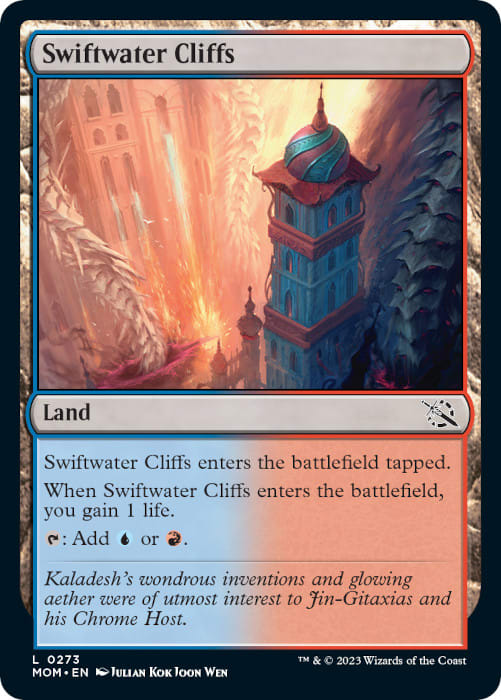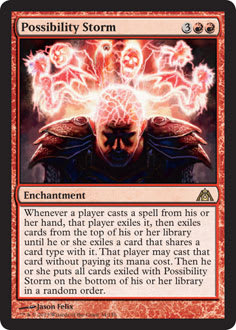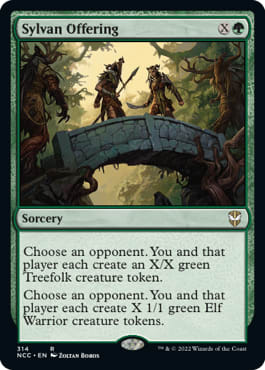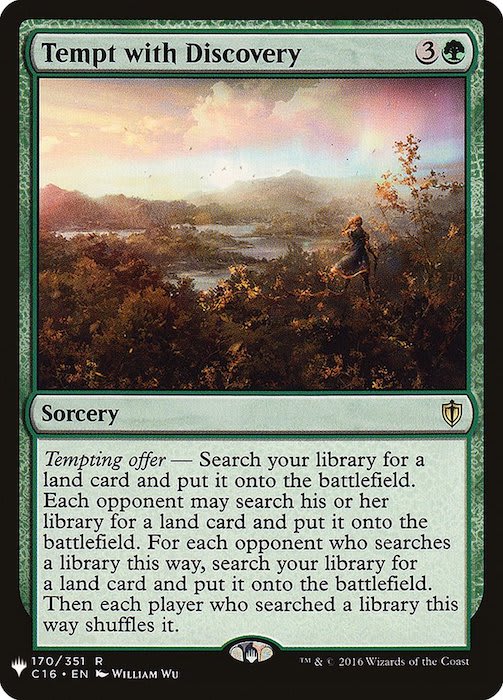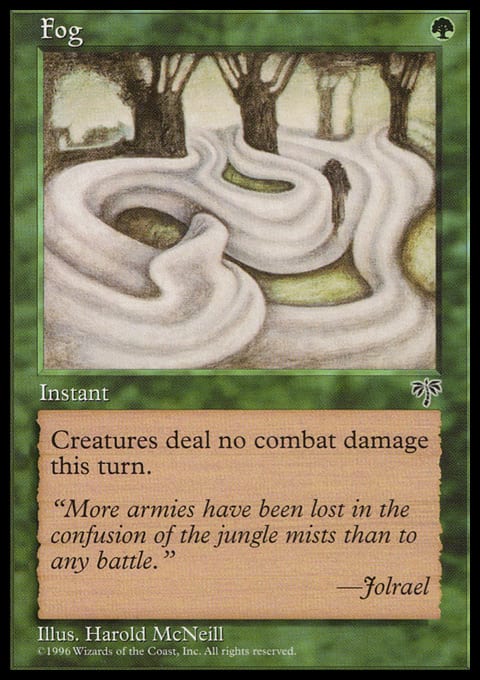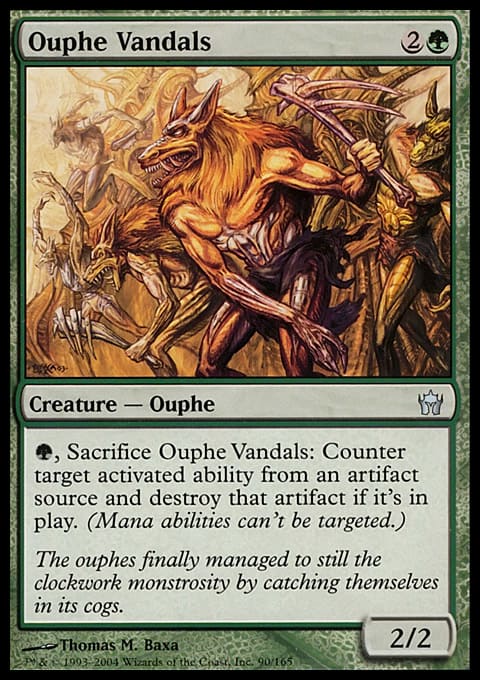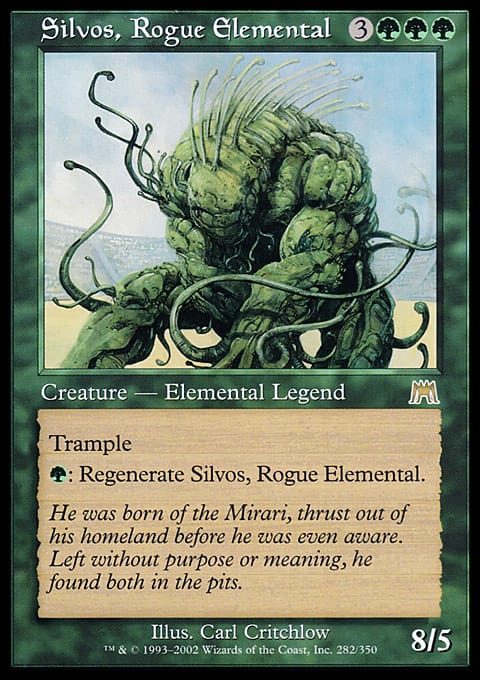
When I started to put together columns that weren't as focused on decklists, I was initially drawn to the idea of doing list-style articles. Top 10 lists are fun and they provide a structure for me to work around, but they're usually very subjective.
My top 10 big green creatures that look like Ents but that aren't actually Treefolk might be capped off with Multani, Maro-Sorcerer, but yours might have some other great card in the number one slot. Who is right and who is wrong can be debated endlessly, but it's hard to argue that these lists have a strange way of drawing the reader in. You see if you can guess what the top few spots are, and you might even root for your favorites to top the list.
Today's column is the first in what may become a series that I'm calling "Cards to Consider".
You may or may not decide to add these cards into any of your decks, but they're worth thinking about and I will do my best to sell you on them, or at the very least sell you on the idea of adding in cards like them to your decks.
My inaugural "Cards to Consider" is a simple one - cards to consider for casual play in Commander.
That begs the question: what is "casual" play?
To me, casual play is NOT everything outside of cEDH, and it is also not any EDH game where there is no prize. I'm using "casual" to describe games of Commander where your power levels are relatively low and you are all genuinely hoping that everyone has a good time. One might think that last part describes every game of EDH, but in truth I've seen lots of high and even mid powered games where someone really doesn't care about the experience of anyone other than themselves.
Casual play is about winning but it isn't about making your tablemates miserable.
You may not always know what your tablemates think is "un-fun" but you generally want to err on the side of letting people play the game, play their decks, advance their boardstates and actually have a game. Sure, you stop their wincons and protect yourself from dying as much as possible, but you generally let them threaten those wins and assemble scary boardstates.
10: Suboptimal Lands
Back when you could meaningfully call a deck "precon level", there was one thing we would all do when we first started to upgrade the precon for play against stronger tables. We would go through and swap out all of the terrible, no-good, suboptimal lands they would put into those decks.
You don't play a land that enters tapped if you're racing to slam down a wincon as soon as humanly possible. Tap lands come in all shapes and sizes. Some let you gain life. The Temple cycle lets you scry when they enter the battlefield. Some just enter tapped, but they all send a clear signal to your tablemates. You're playing a deck with a slightly more casual approach. Even if the rest of the deck is fairly strong, playing lands that enter tapped is a way to slow your roll. They represent a very easy way to slightly drop the speed of your deck and communicate to the table that you're not just trying to win at all costs.
You might play lands that enter tapped as a way to curb your spikier tendencies. You might use them to take a deck that has been dominating play and throttle it back a bit in the hope that your games will be more fun for everyone. They're terrible in the eyes of players that don't understand the concept of playing to a lower power level for the enjoyment of everyone at the table. This column isn't for those players, but suboptimal lands are a great way to slow down and make for a slightly longer, slightly more casual experience.
9: Possibility Storm
If there is one thing spikey, competitive players seem to hate, it is not being able to control what is going to happen when they engage in very basic game actions, such as casting a spell.
Some casual players hate Possibility Storm as well, but I've never found a better card to help me relax and stop worrying so much about winning and losing. When Possibility Storm is on the battlefield any spell you cast gets exiled and then you exile cards off the top of your library until you exile a card that shares a card time with the original spell. You cast that spell and put all of the cards exiled with Possibility Storm on the bottom of your library in a random order.
The beautiful thing about Possibility Storm is that you no longer have much control over what you are casting, and you are constantly being surprised by what you "flop" into and get to cast. Some players hate it. Some love it. I find it hard to get too stressed out over the choices you make during your turn if you don't know what's going to happen when you cast a spell. You might luck into a win or cast the worst possible spell for the situation you are currently in, but whatever happens - it's not your fault!
It is possible to build decks that work with this old red enchantment, and you can even turn it into a powerful tool in the 99 of certain commanders, but Possibility Storm can play a great role in making a game of EDH feel just a little more casual.
8: Offerings
In the history of Magic there have been an awful lot of selfish cards. Most cards benefit you, hurt your opponent, or if you're lucky - both. Every once in a while you run into a card that was built to let you help yourself and help one (or more) of your opponents.
Sylvan Offering is a sorcery that lets you create an X/X Green Treefolk creature token and X 1/1 green Elf Warrior creature tokens. That's a lot of power for your mana, but the drawback is that you also have to give an opponent a matching Treefolk and you have to give an opponent a matching brigade of Elf Warriors. You can choose the same opponent for both triggers, and you can also find ways to steal those tokens or otherwise render the gift meaningless.
The great thing about cards like Sylvan Offering or the land Forbidden Orchard, which gives out a 1/1 Spirit when it taps for mana, is that you can choose to help out a tablemate who is having a terrible start to their game.
Everyone has the occasional game where nothing goes right in the early game and they're facing down a table full of scary threats without so much as a blocker to throw in the way. Cards that give an opponent a blocker could be the difference between life and death for them. They go a long way towards giving someone who is having a rotten start to their game the chance to draw into enough lands or creatures to eventually establish a board. Sometimes they even end up winning, but these cards aren't winning or losing - they're about trying to help out the player who is furthest behind so they end up having fun too.
7: Tempting Offers
I can't count the times I've convinced players to not go along with a Tempt card. These cards are traps - they lure your opponents into agreeing to get some benefit but for each player that does the original caster of the Tempt spell gets even more of a benefit.
I've also cast my share of Tempt spells, or more accurately, I've cast Tempt with Discovery lots of times. I don't love this spell for high powered, fast paced play because it costs four mana and there's a good chance you'll only get one land. I do, however, love this spell for casual play.
The trick is that in casual play you don't want to be trying to bust the game wide open. I don't think it's "casual" to use Tempt with Discovery to grab Dark Depths and Thespian's Stage so you can create a 20/20 flying indestructible Avatar token to murder your tablemates with. That play is slow enough to not see play in cEDH but you might want to pull that trick in high powered or even mid powered play at the right table.
So why would you play Tempt With Discovery in a low-powered, casual meta?
Simple - it's the kind of spell where you get a benefit and you may just help out that one unlucky soul who has a single land on turn 5 and is wondering why they're even playing any more.
If you've got experienced tablemates who are wary that you're going to tutor up some powerful set of lands like Cabal Coffers and Urborg, Tomb of Yawgmoth, you can make it easy for them. Promise to only tutor up basic lands. If it's truly a casual game, none of your tablemates are going to go grab a Gaea's Cradle. You'll be more likely to both get a few extra lands and help someone out who otherwise might pass up your "Tempting Offer" so they don't hand you the win.
6: Three Drop Mana Rocks
If there's an easy way to tell if your table is truly casual, see how they react if you play a Cluestone or Keyrune. Any three-drop mana rock is likely to get a reaction from your more competitively minded tablemates, but playing these in your deck sends a message to the table that your main focus as a deckbuilder isn't just optimization and making it as fast as possible.
Your spikier friends are right. 2-drop mana rocks are simply better but playing 3-drop mana rocks isn't that different from playing lands that enter tapped. You're building your deck with suboptimal cards because you're not trying to just race to the finish line. You are playing for a longer game. Maybe you are hoping other players will be able to do more before you start pushing for a win. Maybe you have a powerful commander that you love to play and you're trying to slow it down so you can play the deck in a less competitive meta.
Whatever your reason, it can be difficult to put the brakes on and slow your game down so that other players end up having more fun. Loading your deck up with slightly more expensive mana rocks is an easy way to do that. Say goodbye to your signets and build a deck like it's 2013 again.
It'll still be fun if you've matched your power level and deck speed to the rest of the playgroup and those 3-drop mana rocks send a clear message that you "get it." Casual play is a shared journey, not a race, and you know full well that if you get too far out ahead, it can be frustrating and less fun of a game for everyone else.
5: Fogs
There's nothing more fun than stopping someone's alpha strike with a well-timed fog, even if it means you've only bought yourself a single turn to try to find an answer.
In high powered play, preventing combat damage can sometimes be effective, but a player on a high-powered deck is far more likely to have an answer for your cute little delay tactic. I've played against highly competitive players and have had that deflating feeling when the Fog I was going to use to buy myself a turn got countered. Playing Fogs can be fun, but it isn't a great way to win games or even survive very long at high powered tables.
In casual games, not only can a Fog sometimes leave a player open because they swung out to win the game, they can also be used to save another player. If the idea of using a Fog to save another player sounds like crazy talk, remember that we're talking about casual games in today's column. You might save it for yourself, but you might also be able to leverage that favor into help later on. A deal as simple as "kill me last if I save you" can give you one less player to worry about during the mid-game. You can deal with them later if you make it to the end, and you might just have a better time with one less player bummed out because they got knocked out early.
I don't think it's your job to keep everyone in the game until the very end, but in a casual game it can be less fun when someone gets knocked out early. Playing politics and using your Fog as leverage can work really well. I don't necessarily recommend just playing "fog tribal" but sprinkling a Spore Frog, Darkness, Inkshield or other Fog effects into your decks will make them a lot more fun to play and maybe a little more casual.
4. Caustic Caterpillars
There are lots of ways to play removal. You can load up on cheap, flexible spells like Return to Nature that come out of nowhere and can deal with lots of problems. You can even play free spells like Force of Vigor, but for casual play I'd like to suggest there is a friendlier option you might consider.
There's nothing wrong with playing instant-speed removal but playing permanents that get sacrificed to remove something is a much more casual approach to interaction. If you want to read "much worse" into that sentence, I can't really argue with you, but hear me out. What a card like Caustic Caterpillar does is present a hurdle to your tablemates rather than coming out of nowhere to stop their clever plan(s) in their tracks.
Maybe it's trivial for a player that wants to combo off to tutor up some removal before they play out their wincon, but in casual games you're a bit less likely to be playing against those kinds of decks. You can still use it to blow up a Ghostly Prison or some other problem on your turn, but you're less likely to surprise them.
The last advantage of having a creature like Caustic Caterpillar is that it can serve as a blocker. In casual EDH you are far more likely to have to deal with the threat of combat damage than other kinds of problems. Permanents that just have to be removed do show up in casual EDH, but blockers are almost always valuable.
3: Spectral Searchlight
I can't tell you how many times I've thought about putting Spectral Searchlight into a deck. I have occasionally run it but I find myself pulling it out again because it's one of those dreaded suboptimal 3-drop mana rocks. I so often find my more casual decks getting crushed at the LGS that it's hard for me to build a deck with a more casual approach to EDH. That said - there may be no mana rock more suited for casual play than Spectral Searchlight.
You can use Spectral Searchlight or its colorless kin, Victory Chimes, to give another player mana. If you play either of these mana rocks in your deck, you get to play the role of helper for a tablemate that is having a rough start. You also have the very real chance to be able to help someone stop a game-ending threat when they otherwise wouldn't have the mana available to them.
The great irony of these mana rocks is that you see fewer moments where a single mana would "save the table" in casual play, but it isn't considered a playable mana rock in cEDH or high-powered EDH. That doesn't mean it isn't worth running in a casual deck. I love the idea that there will be games where that one mana makes a difference and I also love the fact that it lets players work together to deal with a problem.
It may not play a key role in a game very often, but when it does you will thank your lucky stars that you put it in your deck.
2: Play Obscure Cards!
We're playing a format where we can choose to run cards from the entire history of Magic the Gathering. Why play Caustic Caterpillar, an example of very efficient creature-based removal, when you could play Thrashing Brontodon, Viridian Zealot or a combination of even more limited options like Scavenger Folk, Druid Lyrist or Ouphe Vandals?
My point isn't that you should run Ouphe Vandals. My point is that there is a real delight in playing cards so old and so odd that you'll get a reaction from your tablemates. They might love your weird old cards, or they might tire of the goofy old stuff, but if you manage to kill someone with Bouncing Beebles or steal something with Legacy's Allure you'll have really done something. Anyone can win games with Dockside Extortionists, Rhystic Study and Esper Sentinel, but when you're scraping the bottom of the jank barrel, you're also giving yourself the kind of challenge that many Commander players shy away from.
1: Play Obscure Commanders!
If obscure cards are fun and can genuinely liven up a game of commander, the same is true for the card you choose to put in the command zone. It's hard to pull yourself out of the habit of playing powerful, well-known commanders. They're fun and they're popular because they are good at what they do, but if you're genuinely interested in embracing your casual side there's no better place to start than at the top.
Again, I'm not telling you to build around Silvos, Rogue Elemental, but I've done it and it's a great example of how you can mix things up. Old, obscure, suboptimal commanders can make you work extra hard as a deckbuilder to find a way to make your deck work and actually win games. They can also give you a deck that is less dependent on their commander, which in itself can be a good thing.
Whether you search EDHRec for some of the least popular commanders, you dig through bulk rares for a legendary creature you've never seen before, or you challenge a friend to pick something weird for you to build around, you're going to have fun and you're likely to have a deck that can play at lower powered, casual tables without ruffling too many feathers or running away with too many games.
One of my favorite decks is a deck I built on a lark with a weird old green legendary creature named Multani, Maro-Sorcerer. I build lots of decks around newer and more popular commanders as well, but there's something really fun about having a deck that you'll probably never see anyone else play.
Final Thoughts
If it sounds like I'm suggesting that casual players need to be treated with kid gloves it's because I have grown to conflate casual play with restrictions on what kinds of cards and strategies you can play. If you come out too fast or play too strong, you're going to have tablemates who don't think you understand the casual game.
If you're going to drop a combo, it should probably be a Rube Goldberg device that is made up of many parts and isn't impossible to stop. You don't drop Thassa's Oracle in low powered play, but exactly where the line between what's OK in casual EDH and what isn't OK is going to vary from playgroup to playgroup. Your table might not get upset with how your deck tries to win games, but then again, salt does sometimes flow in games of Commander. I try to lean towards "kid gloves" until I feel like I know a group and have a feel for what won't ruffle feathers.
Even if you don't think you'll ever play in a truly janky, low-powered meta, I think many of today's suggestions can be used to freshen up your game and add a little fun to casual decks at any power level lower than competitive EDH. Dropping a Constant Mists against a Prossh Food Chain deck aiming to kill the table with combat damage. They'll probably have other "outs" but you might buy the table enough time to find a boardwipe. Playing cards that force you to give another player a benefit of some sort is a great way to help keep someone having a rough start from having a rough game, regardless of power level.
Most of us play to win, but we also play for the fun of everyone involved. This applies to everyone, even cEDH players, but the cEDH mindset is a bit different from the way we approach the game at lower power levels. If you enjoyed this exploration of cards and types of cards you might want to try playing if you want to build some more casual decks, let me know. I'm very likely to circle back to this "cards to consider" format and would love to hear your suggestions in comments when this column gets posted on CSI's Facebook page.
That's all I've got for today. Thanks for reading and I'll see you next week!














